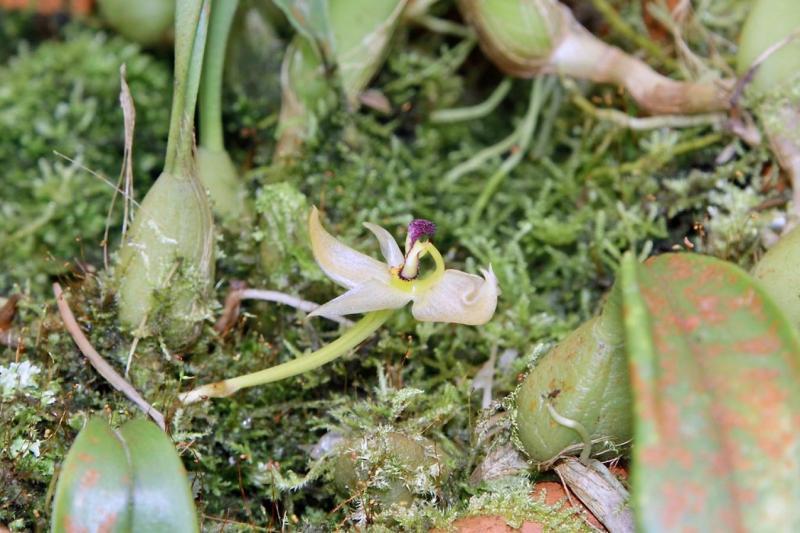Bulbophyllum ecornutum
Also known as: The Hornless Bulbophyllum or Bulbophyllum ecornutum var. deliense Bulbophyllum ecornutum var. teloense Bulbophyllum cornutum var. ecornutum Bulbophyllum ecornutum ssp. ecornutum Bulbophyllum ecornutum ssp. verrucatum Hamularia ecornuta in the subfamily: Epidendroideae
Native to: Thailand
General Information
The Hornless Bulbophyllum is a cool to warm growing epiphytic orchid belonging to the sub family Epidendroideae native to Thailand. It is named after the Latin for lacking horns, refering to the abscence of protusions on the column as compared to Bulbophyllum cornutum which has them.
Plant Description
Each new growth has a single lance shaped leaf
Flowers
Numerous fragrant blossoms appear during Autumn
Fragrance
The orchid is fragrant.
Blooming Season
- Autumn
Care Notes
These orchids have a fine root system that can quickly die back if left dry for too long, but also does not like to be kept wet, so water regularly but ensure that the mix is dry before watering.
Fragrant:- IsFragrant
Climate
These orchids thrive in hot, steamy locations, living in low altitude jungle areas where they often receive heavy sporadic rainfall, warm humid winds, and sunlight filtered year round by the surrounding growth.
They can survive, but will often struggle if the humid, warm conditions are not met - roots will die back and leaves will thin out, spikes and buds can be aborted if conditions change too frequently during flowering. They can tolerate cooler or drier conditions temporarily, but extended exposure will seriously affect them.
They will grow best in the tropics, especially coastal areas where they receive ocean breezes, but can do well in a greenhouse, supplied that the humidity is kept high, temperature is not allowed to skyrocket and extra shade is provided during hot weather.
Grows at low to high elevations.
Potting
These plants are quite forgiving and will do well repotted ever 2-3 years. The mix should be coarse, well draining, and allow space for air to move and for roots to grow.
Alternatively, these plants will also do well mounted to tree fern or cork slabs, or mounted to trees.
Best time for repotting or mounting the orchids is the end of winter when new growths start to appear. Avoid repotting during hot weather,


